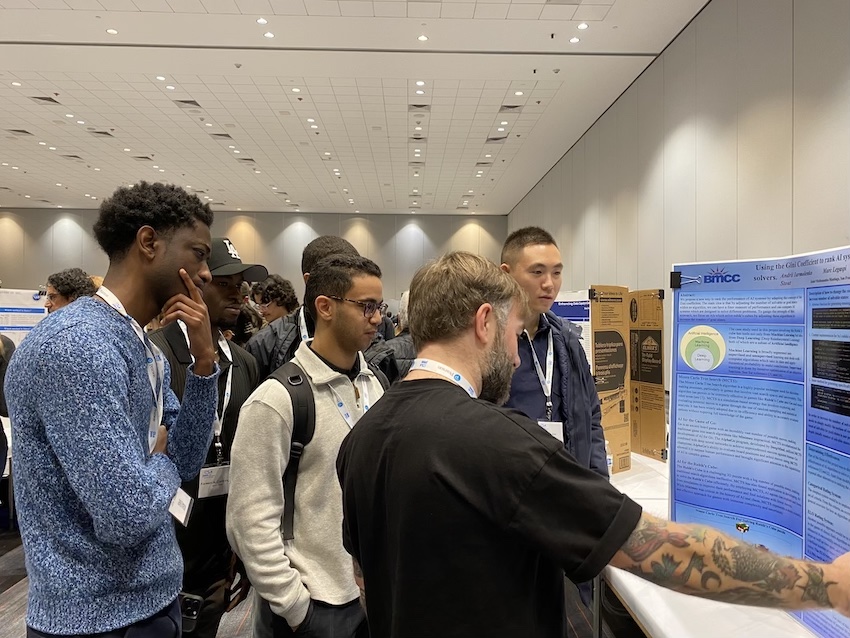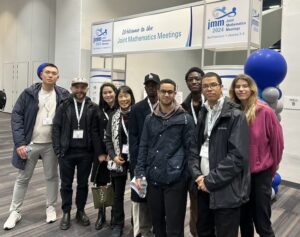
February 13, 2024
Over 5,500 mathematics educators, researchers and students gathered in San Francisco on January 3 through 6 as part of the 2024 Joint Mathematics Meetings (JMM), a gathering touted by its organizers as “the largest mathematics gathering in the world.”
The conference featured dozens of mathematics and STEM organizations, including the American Mathematical Society (AMS), which hosted presentations by Borough of Manhattan Community College (BMCC/CUNY) students, alumni and faculty.
Among the participants from BMCC was Data Science major Jafar Abubakar, who said that participating in the conference was a pivotal moment in his academic journey.
“It marked a transition from theoretical understanding to practical application,” Abubakar said, adding that a workshop on the machine-assisted proof, particularly resonated with him.
“This session not only expanded my knowledge of linear algebra but also showcased its vital role in my overall machine learning understanding. It ignited a passion for exploring the intersection of mathematics and technology.”
NSF grant kicked off in Summer 2023 enables research presented at 2024 JMM conference
The BMCC trip to San Francisco for the conference was funded by the National Science Foundation (NSF)-funded project, “Creating Data Science Pathway for STEM Students Success,” which helped to establish the new Data Science Associate of Science (A.S.) degree program in the BMCC Mathematics department.
“Without the summer research program where many of these projects were started, we would not have been able to have such a strong showing at this important national conference,” said Mathematics Professor Yi Annie Han, who is Principal Investigator (PI) for the NSF-funded project. She adds that Math Professor Jorge Florez coordinated the summer program.
“Each research project presented at the 2024 JMM had a faculty or staff research mentor,” adds Professor Han. “That was made possible by the BMCC Summer Student Data Science Research Program which was supported by the NSF grant. Last summer at BMCC, 20 STEM students along with 15 professors and staff from the Mathematics Department, E-Learning Center and Office of Institutional Effectiveness and Analytics completed an NSF-funded program. This past January, we saw the results of that work, through BMCC’s presence at the JMM in San Francisco.”
Sharing BMCC’s strategies for welcoming more students to STEM fields, Mathematics Professor Yi Annie Han delivered a presentation on the NSF-funded project.
“Bringing community college students to academic conferences not only enhances their STEM research knowledge, but it also gives students inspiration for their future education and careers,” said Professor Han. “It is a great networking opportunity, and they meet STEM experts and peers from around the world.”

BMCC teams present on the intersection between math and AI, and more.
In the American Mathematics Society (AMS)/PME (Pi Mu Epsilon) Undergraduate Student Poster Sessions, three student research posters—all of which originated in the BMCC Summer 2023 Data Science project—were presented
Computer Science majors Jun Ha Kim and Miguel Silva, along with Mathematics alumna Jingyue Gao presented their summer Data Science research poster, “Early BMCC ‘Connect2Success’ System Alert Enhance Students’ Performance.”
Engineering Science major Andrii Iarmolenko, along with Computer Science majors Marc Legaspi and Computer Science alumnus Peter Vaiciulis presented their summer Data Science research poster, Using the Gini Coefficient to rank AI systems: a case study using Rubik’s cube AI solvers.
Computer Science alumnus Ahmed Abdelsalam presented his BMCC Summer 2023 Data Science Research Project, “A Comparative Analysis of K-means using the Pythagorean Means.”
In an AMS special session organized by BMCC Math Professor Chris McCarthy on quaternions (which represent spatial orientations), Mathematics Professors Johannes Familton and Terrence Richard Blackman contributed to the talk with information on applications of quaternions in computer animations, molecular biology and more.
Professors McCarthy and Familton also co-organized a special session on the mathematics of DNA and RNA.
Students describe “an inspiring experience, seeing people from all walks of life, finding a place in STEM.”
“This was the first time I participated in such a grand math conference,” said Yanhua Li. “I have benefited a great deal from it. The conference offered me an opportunity to network with professionals and scholars from all over the world. Also, observing different types of presentations enabled me to stay updated on current research trends as well as exploring my interests.”
Kim Jun Ha said the seminars aligned with his interest in computer science.
“I was particularly interested in research that focused on the realm of machine learning and 3D-printing,” he said. “As a student presenter at the undergraduate poster session, I discussed how the Connect2Success system at BMCC-CUNY may be leveraged at the beginning of any given semester to enhance student performance.”
He recounts having met attendees from other schools, such as Grinnell College and Tufts University, who expressed interest in developing in-house software to alert students about their performance, early in the semester.
“We agreed to share our respective research results, with the hope of perhaps collaborating with one another in the future,” said JunHan.
Inija Martinaviciute said the conference and trip to San Francisco expanded her understanding “of what math could be.”
“It was a great opportunity to get to know my peers in the Data Science field, better,” said Martinavicuite. “Also, the conference itself was a very inspiring experience, just seeing people from all different walks of life and ages participating, and all of them finding a place for themselves in STEM.”
Overall, the experience confirmed for Martinavicuite that “STEM knowledge can be applied in any field. Whatever you are interested in, there is a job with data and math in that field. Lastly, being in a tech-driven city like San Francisco and seeing self-driving cars, really made these huge tech conglomerates closer and not as intimidating.”
Conference provides valuable networking opportunities
Andrii Iarmolenko said the best part of attending the conference was presenting a poster, “Using Gini coefficient to rank AI systems: a case study using Rubik’s Cube AI solvers,” which covers “the fascinating intersection of mathematics and artificial intelligence.”
The poster was a result of Iarmolenko’s summer internship at BMCC, where he worked alongside Mathematics Professor Andrew Stout.
“The poster presentation was an excellent opportunity to share our research findings and receive valuable feedback,” said Iarmolenko. “The conference offered a unique networking opportunity, in which I had the chance to interact with mathematicians and professors from various institutions. This exposure to different perspectives in the field has fueled my passion for the subject and enhanced my academic growth.”
Kareem Codrington said the conference was “one of the most memorable experiences for me as a student.”
Codrington adds that, “Learning about the research that drives innovation in field of mathematics is a catalyst for an underrepresented student like me because I strongly believe that we all have a part to play in making the world a better place.”
Julian Hernandez said the Joint Mathematics Meetings and conference “was an invaluable experience that expanded my understanding of the mathematical community’s breadth and depth.”
He lists as highlights, a talk by 2006 Fields Medal winner Terence Tao, who discussed “the machine-assisted proof, demonstrating how technology can significantly reduce errors and time in complex calculations, a stark contrast to traditional manual methods.”
This presentation, Hernandez said, among others, “underscored the evolving landscape of mathematical research and its potential to enhance our work. The conference also showcased diverse participants, from students to seasoned educators, all sharing a common passion for mathematics.”
Learn more about the BMCC Data Science program in the Mathematics Department online, visit 199 Chambers Street, Room N-599N or email smarrajh@bmcc.cuny.edu.
Learn more about the National Science Foundation (NSF)-funded curriculum project, “Creating Data Science Pathway for STEM Students Success,” which led to the creation of BMCC’s Data Science program in the Mathematics Department.
Learn more about Student Research Opportunities in STEM at BMCC.
STORY HIGHLIGHTS
-
BMCC students, alumni and faculty attend 2024 Join Mathematics Meetings in San Francisco, presenting in the American Mathematical Society section of the conference.
-
Trip is funded by the NSF-funded project, “Creating Data Science Pathway for STEM Students Success,” which helped to establish the new Data Science program in the BMCC Mathematics department and was led by Mathematics Professor Annie Han.

